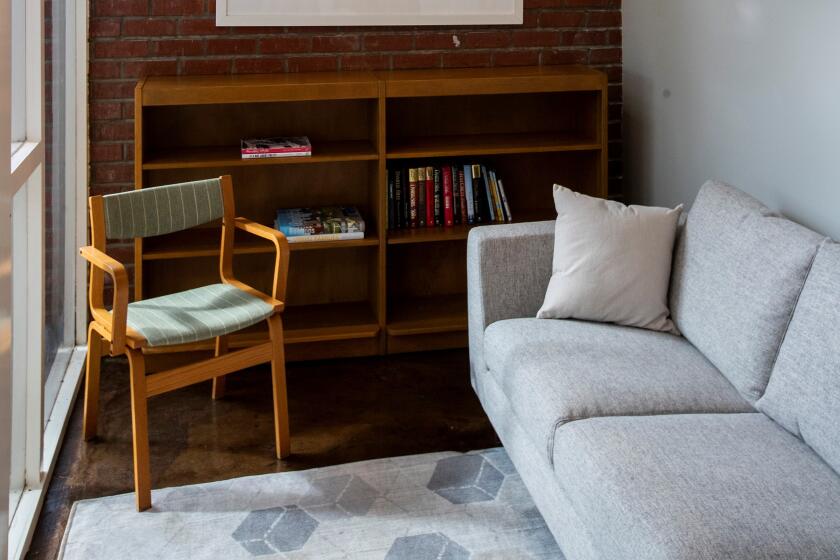Comedy show ‘Normalize Everything’ aims to de-stigmatize mental illness by joking about it
- Share via
For a spirited hour and a half during a stand-up-comedy livestream on Saturday, to be the child of a parent with schizophrenia was the norm.
Discussion topics included: Is it worse to grow up with a parent with schizophrenia or one with schizoaffective disorder, where you have symptoms of both schizophrenia and a mood disorder? “I think I win,” comedian Johan Miranda said.
Comedian Maddie Connors has been spending the pandemic quarantined with someone who has borderline personality disorder — “arguably worse,” she said.
Atsuko Okatsuka, the creator of the show “Normalize Everything,” told her co-host, Connors, that she first learned about borderline personality disorder from the film “Girl, Interrupted.”
“I was a teenager, and I just thought Angelina Jolie and Winona Ryder were so hot,” she said. “She made borderline personality disorder — to me, at that time — look cool.”
“It is a hot one to have right now,” Connors joked.
“Normalize Everything” debuted with a lineup of comedians who were also children of parents with mental illness: Okatsuka, Connors and Miranda were joined by Jeena Bloom and Kazu Kusano.
Though Okatsuka purposefully didn’t dictate any rules for the content of the comedy, most of the comedians touched upon what it was like to grow up with a parent who had difficulties distinguishing reality from hallucination — and also what it was like not being able to talk about it.
Kusano recalled as a child telling her first jokes while making up stories about her mother. Kids always asked her about her parents, she said, but she couldn’t tell them their family secret — that her mom had schizophrenia.
Bloom didn’t learn that her mother had paranoid schizophrenia until her mom was diagnosed with terminal cancer. Bloom said she now realized they were both afraid of disappointing each other. As a result, her mother hid her mental illness, and Bloom never came out to her mother as transgender.
Okatsuka told the audience about how she and her husband had mothers with schizophrenia, so people always say that’s the reason they got married.
“Can you imagine that being your only criteria to find a partner?” she said, before telling a story about the joy, relief and lust they felt the first time they realized they understood each other’s situation.
The show raised money for Painted Brain, which integrates art, technology and mental health. It started as a magazine, when Dave Leon, a therapist, saw a need to build community among people with mental illness.
Created with the help of his co-founders, Rayshell Chambers and David “Eli” Israelian, Painted Brain has been a nonprofit since 2016.
The organization is peer-run: The three co-founders have experience with mental health challenges, and one of their missions is to show that people with mental illness can play a big part in helping one another recover.
Israelian, who lives with schizophenia and obsessive-compulsive disorder, has been proactive about connecting Painted Brain with local comedians and working with organizations like Comic Cure.
“I’ve used comedy as a way to remedy my mental health,” Israelian told the crowd on Saturday. “So I’m really thankful to be on the call with so many of you that are having us laugh so we can lower our symptoms. I can tell you: I was hallucinating maybe 25 minutes prior to this, and now my hallucinations are gone.”
He laughed.
“It’s terrible, but it’s true. You can laugh. I’m not going to be offended.”
Leon had warned the crowd earlier that both social workers and people with mental illness tended to have a dark sense of humor.
He also thinks that therapy and stand-up comedy have similarities.
“It’s the place to say the unsayable and to express things you really can’t express anywhere else,” he said. “You get a lot of stuff out that’s really hard to acknowledge or deal with otherwise. I think it’s two sides of the same coin.”
“When you’re on stage,” Israelian said, “you know you have everybody’s attention. Everyone in there becomes your therapist, almost. They might heckle you. ‘Shut the hell up, you’re not funny!’ And it’s, like, perfect. I need the truth.”
What is therapy and what happens in a session? What kinds are available? An introduction to a critical tool for better mental health.
Chambers loved the joke comedian Miranda told during his “Normalize Everything” set, which was about how, when he was a kid in therapy, he felt like he was snitching on his parents.
“My mom put me in therapy as a kid, too,” she said. “With stigma in the Black community, that’s really what it is. ... It brought me to a time when I was a young girl, when I was snitching on my mom!
“No, my mom was happy I was talking to a therapist,” she continued. “We have to normalize getting help and normalize getting access to resources. How do we feel safe getting help without feeling like we’re getting into trouble?”
Okatsuka hopes to expand the show, showcasing not only more comedians with parents with mental illness, but also comedians who have mental illness themselves.
“The cool thing about mental illness is that there’s a lot of us with it, so we could do 400 other shows,” Okatsuka said.
Comedy “brings great light and joy to acknowledging something that people are so afraid of,” Israelian said, “ so people don’t have to feel like they’re walking on eggshells.”
It’s been a rough year, and maybe you are considering therapy for the first, second or fifth time. It takes patience and effort to find the right therapist. Here’s a breakdown of what you need to know.
More to Read
The biggest entertainment stories
Get our big stories about Hollywood, film, television, music, arts, culture and more right in your inbox as soon as they publish.
You may occasionally receive promotional content from the Los Angeles Times.












